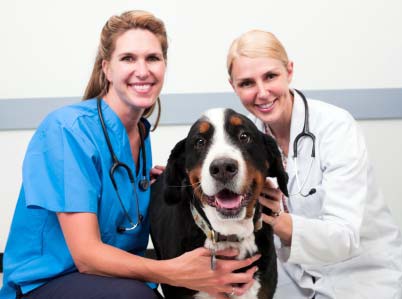
Going to the vet repeatedly over several months for vaccinations, and then for boosters throughout the dog’s life, may seem like a bother, but the diseases from which vaccines shield our pets are truly dreadful, potentially deadly, and largely preventable.
Always discuss vaccine schedules with your vet, since not all dogs need every vaccination. But to let you know why vaccinations are important, here are descriptions of the diseases they will help your pet avoid.
Bordetella Bronchiseptica is a highly communicable bacterium that causes severe fits of coughing, whooping, vomiting, and, in rare cases, seizures and death. It is the primary cause of kennel cough. There are both injectable and nasal spray vaccines available.
Canine Distemper is a virus that attacks the respiratory, gastrointestinal (GI), and nervous systems of dogs, wild canids, raccoons, skunks, and other animals. It causes discharges from the eyes and nose, fever, coughing, vomiting, diarrhea, seizures, twitching, paralysis, and, often, death. There is no specific drug for the virus—the symptoms can be alleviated, giving the dog’s immune system a chance to fight it off.
Canine Hepatitis is a disease of the liver caused by a virus that is unrelated to the human form of hepatitis. Symptoms range from a slight fever and congestion of the mucous membranes to severe depression, vomiting, jaundice, stomach enlargement, and pain around the liver. Many dogs can overcome the mild form of the disease, but the severe form can kill. There is no cure, but doctors can treat the symptoms.
Canine Parainfluenza is one of several viruses that can contribute to kennel cough.
Coronavirus is a nasty virus that usually affects dogs’ gastrointestinal systems, though it can also cause respiratory infections. Signs include most GI symptoms, including loss of appetite, vomiting, and diarrhea. Doctors can keep a dog hydrated, warm, and comfortable, and help alleviate nausea, but there is no drug that kills coronaviruses.
Kennel Cough, also known as infectious tracheobronchitis, results from inflammation of the upper airways. It can be caused by bacterial, viral, or other infections (see bordetella and canine parainfluenza), and often involves multiple infections simultaneously. Usually the disease is mild and self-limiting, causing bouts of harsh, dry coughing, sometimes severe enough to spur retching and
gagging, along with a loss of appetite, but in rare cases it can kill. It is easily spread between dogs kept close together, which is why it passes quickly through kennels. Antibiotics are usually not necessary, except in severe, chronic cases. Cough suppressants can make a dog more comfortable.
Leptospirosis, unlike most diseases on this list, is caused by bacteria, and sometimes evinces no symptoms at all. When symptoms do appear, they can include fever, vomiting, abdominal pain, diarrhea, loss of appetite, severe weakness and depression, stiffness, muscle pain, or infertility. Antibiotics are effective, but the sooner they are given, the better.
Parvovirus attacks the gastrointestinal system and creates loss of appetite, vomiting, fever, and often severe, bloody diarrhea. Extreme dehydration can come on rapidly and kill a dog within 48 to 72 hours, so prompt veterinary attention is crucial. There is no cure, so keeping the dog hydrated and controlling the secondary symptoms can keep him going until his immune system beats the illness.
Rabies is a virus that invades the central nervous system, causing headache, anxiety, hallucinations, excessive drooling, fear of water, paralysis, and death. Treatment within hours of infection is essential, otherwise death is highly likely. Most states require rabies vaccination at set intervals (every one to five years). Check with your vet about local rabies vaccination laws.
 Dangerous Foods for Dogs
It’s only natural for dogs to
Dangerous Foods for Dogs
It’s only natural for dogs to
 How to Cure a Dog With a Stomach Ache
How to Cure a Dog With a Stomach Ache
How to Cure a Dog With a Stomach Ache
How to Cure a Dog With a Stomach Ache
 How to Care For Emergencies and First Aid
Even the best-cared-for dog may bec
How to Care For Emergencies and First Aid
Even the best-cared-for dog may bec
 Tapeworms in Dogs: Symptoms, Treatment, & Prevention
What are Tapeworms?
Tapeworms are
Tapeworms in Dogs: Symptoms, Treatment, & Prevention
What are Tapeworms?
Tapeworms are
 Why Do Dogs Chew?
Why Do Dogs Chew?
Why Do Dogs Chew?. M
Why Do Dogs Chew?
Why Do Dogs Chew?
Why Do Dogs Chew?. M
Copyright © 2005-2016 Pet Information All Rights Reserved
Contact us: www162date@outlook.com